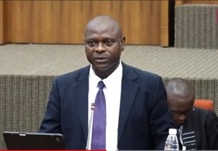Members of the National Assembly have voiced strong dissatisfaction with the Finance and Economic Affairs Minister Seedy Keita for failing to provide a comprehensive and timely update on the execution of the national budget. The lawmakers expressed anger over what they described as the last-minute submission of the supporting document and lack of transparency in how public funds were utilized across ministries and government departments.
The outrage followed the minister’s presentation of an Oral Ministerial Statement on the Implementation and Monitoring of the Annual Budget on Monday, a session expected to offer lawmakers clarity on disbursements, implementation outcomes, and the monitoring mechanisms of approved budgetary allocations.
However, to the dismay of MPs, the crucial document intended to accompany the oral statement was circulated only minutes before the minister took to the podium—leaving little time for scrutiny.
Raising the matter on the Assembly floor, Hon. Sainey Jawara, Member for Lower Saloum, described the action as “undone” and unacceptable in a democratic setup where accountability should be paramount.
“The document was submitted to us just 10 minutes before the reading of the statement. That is not how things should be done,” he said. “This is the national budget we’re talking about. It belongs to all ministries and departments. We expect the Finance Minister to give us a detailed breakdown—how much was allocated to each ministry and how it was spent.”
Jawara also revealed that various ministries have been raising complaints about not receiving their allocations, in contrast with the minister’s official claims—raising concerns about credibility and internal inconsistencies within government financial management.
Hon. Fatoumatta Njai, the Member for Banjul South, echoed the frustration, saying the minister’s report fell short of expectation. She insisted that the Finance Ministry must provide not just figures, but a clear monitoring framework that outlines expenditure by ministry, department, and agency (MDAs).
“Our job is oversight. If we do not receive timely and complete information, how can we monitor spending and implementation properly?” she asked. “Transparency begins with openness. Without the necessary breakdowns, our functions are compromised.”
Hon. Lamin Ceesay, representing Kiang West, took it further by calling for a shift from number-based reporting to impact-based assessments. He criticised the repeated presentation of raw figures without real-life implications.
“We need to understand how the money impacts the lives of our people. What difference did the spending make? Which projects have been completed? What are the outcomes?” Ceesay said. “This will end the complaints from MDAs about not receiving allocations they were promised.”
Other lawmakers also weighed in, warning the Finance Ministry against making a mockery of legislative processes. They argued that delayed submissions and vague financial reporting weaken Parliament’s ability to hold the Executive accountable and could breed corruption and inefficiencies within the system.
The MPs unanimously demanded improvements in budget transparency, accountability, and timely dissemination of reports. Several urged for reforms to strengthen public financial management systems, including the possible establishment of penalties for late submissions by ministries and stronger oversight tools for Parliament.
Meanwhile, in unrelated judicial proceedings, it has been confirmed that 21 witnesses are set to testify in the El-Hella alleged armed robbery case, currently underway in court. The case continues to attract public attention.
In another courtroom development, Justice Jaiteh issued a stern warning to the Director of Public Prosecutions (DPP), condemning what he termed wastage of the court’s time. The judge said that delays and unnecessary adjournments are unacceptable and will no longer be tolerated.
As Parliament demands financial clarity and the judiciary clamps down on inefficiency, it is clear that both branches of government are increasingly calling for greater accountability across the public sector.
